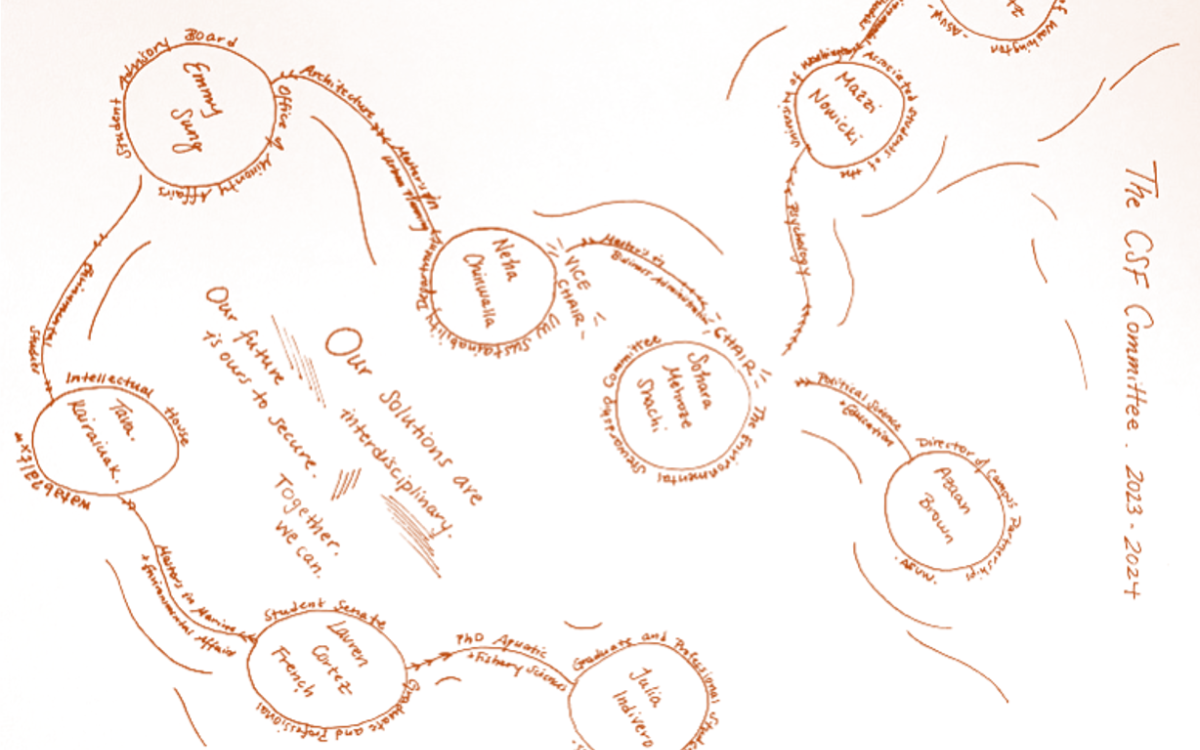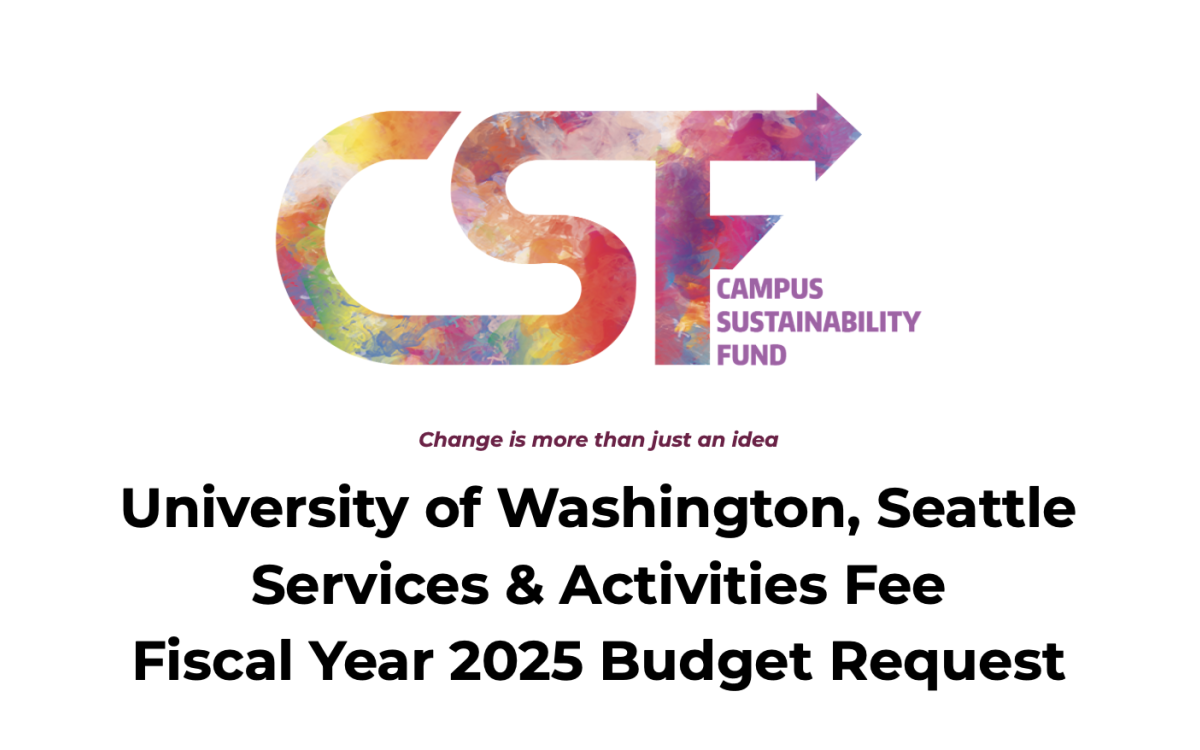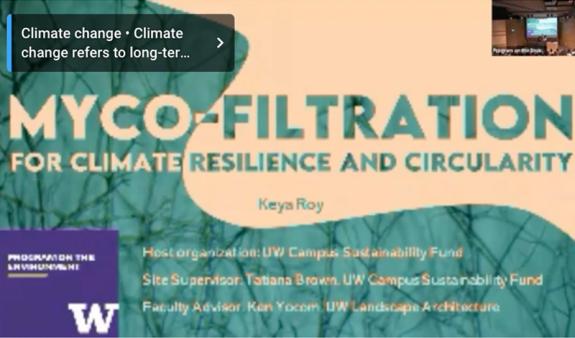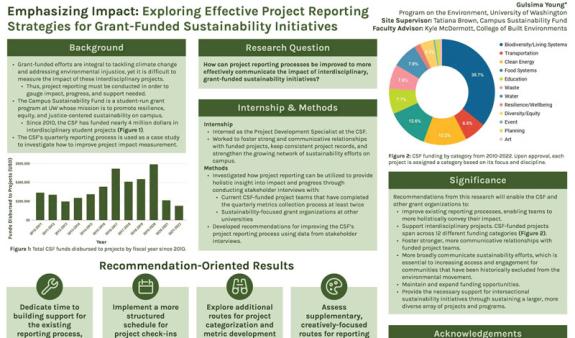"As trustees of student money, we have chosen to make the CSF accountable to the student body at every level -- from the all-student SAF committee that can choose to establish the CSF, to the all-student CSF committee that will allocate the funds, to the student priorities that will guide the allocation."
- The Campus Sustainability Fund Working Group, 11 February 2010
The Campus Sustainability Fund is structured to maximize student voice and influence, within our organization and the UW Campus. The core team of four operates in a horizontal leadership structure and collaborative decision making model, encouraging students to lead and become experts in their issue area (e.g., Grant and Projects + Outreach and Connections).
The CSF Committee serves as our governance structure. These eight voting members are appointed from six different campus partners, promoting diversity in thought and experience among the group trusted with stewarding student funds. The CSF was founded as a grassroots student movement to:
Materially change the way our Seattle campus engages with building a sustainable future.
Center students in this process.
The CSF approaches our working process as an opportunity to showcase our ideal model of sustainability.
The CSF Committee is comprised of eight voting students appointed from our partner organizations, which promotes accountability to the diverse interests of our student body. A mix of undergraduate, graduate, and professional students come from:
Graduate and Professional Student Senate (GPSS)
The Associated Students for the University of Washington (ASUW)
Environmental Stewardship Committee (ESC)
UW Sustainability Department (UWS)
Office of Minority Affairs Student Advisory Board (OMAD SAB)
Wǝɫǝbʔaltxʷ - Intellectual House (IH)
ASUW Board of Directors (Director of Campus Partnerships, non-voting)
These eight voting students are responsible for administering grant funds to invest in student initiatives + projects across campus, strategizing how to support the CSF's mission to lead justice-centered sustainability programming, and engaging in participatory budgeting to shape the annual funding request to the Services and Activities Fund (SAF).
In addition, each member has duties to their appointed body that aim to strengthen our relationship and promote more professional development opportunities.
For example, the position with the Environmental Stewardship Committee comes with a seat on the body that develops and passes environmental policy at the University (e.g., Decarbonization plans, Green Revolving Fund ideation, Waste Management, Air Travel policy, etc.).
Similarly, the ASUW representatives select which ASUW programs to build deeper relationships with that best match their interests (e.g., the Bean Basket, Student Food Co-op, Joint Commissions Committee, etc.).
The Committee is supported by the CSF staff and a network of ex-officio members who provide insight into grantmaking feasibility, content expertise on sustainability, and mentorship for student growth. The goal is to create a well-connected network that promotes the success of CSF as an organization and our funded projects. Some members include Jan Whittington with Urban@UW + UW Solar and Julie Blakeslee from the Design Review Board.
Committee evolution
The CSF Committee composition and role has evolved over the 14-year course to best serve our students.
The original 2010 composition consisted of seven student voting members (three undergrads and four grads) from the ASUW Board of Directors, ASUW Senate, ESAC (now the ESC), and GPSS who were tasked with voting on funding allocations.
Students were from three disciplines: Environmental Studies, Evans School of Public Affairs, and Urban Design & Planning.
The Committee's support structure was more sparse and ex-officios were concentrated among hard science disciplines (e.g., Astronomy) and capital planning administrators.
Today, the CSF is proud to say Committees of recent past have voted to create greater representation and responsibilities.
The Intellectual House, Office of Minority Affairs and Diversity's Student Advisory Board, and UW Sustainability Department now have seats. Undergraduate students have increased representation and students represent many different academic disciplines.
Committee members not only allocate funding for student projects, they contribute to the strategy of the CSF and model how sustainability is an intersectional movement.
The Campus Sustainability Fund is informed by the Just Transition framework and works to model deep democracy within our governance structure. We believe shared decision making between community and those in appointed positions can and should be practiced on our campus at the UW. We predominantly do this through engaging our CSF Committee in a participatory budgeting process.
This participatory budgeting process is an important practice for our organization. Not only does it ground us in our funding ask for the upcoming year, but it offers a space to reflect on what we have been doing this past year and determine what we would like to invest in, state as group priorities, and potentially decrease emphasis on.
Funded by student dollars
To us, it is simple. We are funded by student dollars. Students (represented through our Committee members) should have say over how these funds are allocated to meet interests + priority areas. Each year, our Committee guides the creation of our Budget Request to the Services and Activities Fund (SAF). This includes operational costs like personnel, Committee stipends, new positions, partnerships, educational + outreach, and grantmaking opportunities. We believe a budget determines an organization’s ability to practice its values and achieve its vision – our capacity is dependent on where we have allocated our time and money.
This past year, the CSF Committee was clear in their desire to maintain our role as a prominent funding source for students and grow our efforts in outreach like zine production, teach-ins, partnerships, and intentional collaborative campaigns. Their top three priorities were:
Affirm CSF’s role as a hub for justice-centered sustainability work on campus.
Continue our support for our existing project portfolio (60 projects and counting)
Build capacity for more education and outreach initiatives. Many of them came to learn of us through our outreach efforts and education resources – they want to see us reach and positively impact even more students.
We have strategically organized our committee with functioning subcommittees to help achieve these collectively-held goals and shaped the budget accordingly.
TLDR:
- Goal of "Participatory Budgeting" is to allow community members (in our case, the CSF Committee) to decide how to invest funds.
- The purpose is to support participatory democracy and ensure money is allocated according to citizen desires + agendas. This money up for deliberation can be a portion of funds, the entire budget, or calls for specific investments. For us, it is our entire SAF budget.
- We engage in this process with our Committee because we feel it is important to practice the intentionality of determining how to invest our funds, understand the power money has, and generate a budget that enables us to uphold our values.
The Campus Sustainability Fund believes well-being and sustainability are inextricable. We must take care of ourselves, the planet, and promote reciprocity in our relationships if we hope for longevity.
Undergraduate student employees are compensated at the living wage for Seattle, WA. They receive close mentorship and guidance in reaching their professional goals.
Our only graduate position is offered as a salaried, 12-month Graduate Staff Assistant contract. This comes with tuition remission, comprehensive health benefits, and membership to the UAW 4121 labor union.
Our Committee members are compensated on an annual stipend. Our advocacy marked the CSF as the first student committee on campus that paid their workers and has ignited a movement among other student-led committees.
Our professional staff position was created for program continuity to alleviate stress on students, so they can dive deeper into their topic areas and academic journeys.
We believe you do your best when you are excited about the work you do. Further, when you understand the larger community you work with. At the CSF, our team members have gone on to join the Husky 100, Doris Duke Conservation Scholars Program, Mary Gates Leadership Scholarship Program, Puget Sound Sage Community Leadership Institute, WA Environmental Justice Council, Sustainable and Just Future Fellowship, Evans School of Public Policy Dean's Council, and are recognized across campus for their roles in advancing justice x sustainability.
The Campus Sustainability Fund (CSF) aims to host learning experiences that promote justice-centered sustainability. Our organization has become a natural home for students who work between academic disciplines and are looking for mentorship.
The CSF is proud to host capstone students, CELE ambassadors, publish student artwork in our zine, and serve as a connector to other opportunities beyond our team and campus. We are always looking for more ways to promote student learning!
Read about some of our brilliant capstone students below:






